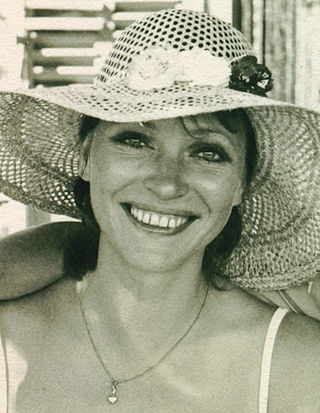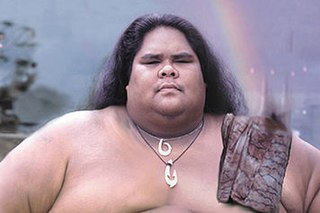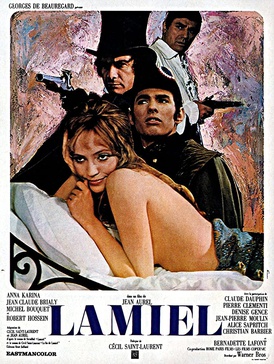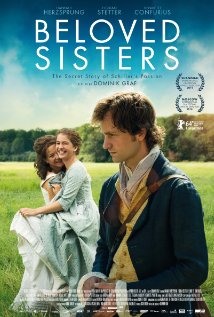Related Research Articles

Anna Karina was a Danish-French film actress, director, writer, model, and singer. She was French New Wave director Jean-Luc Godard's early collaborator, performing in several of his films, including The Little Soldier (1960), A Woman Is a Woman (1961), My Life to Live (1962), Bande à part, Pierrot le Fou (1965), and Alphaville (1965). For her performance in A Woman Is a Woman, Karina won the Silver Bear Award for Best Actress at the Berlin Film Festival.

Israel Kaʻanoʻi Kamakawiwoʻole, also called Braddah IZ or just simply IZ, was a Native Hawaiian musician and singer. He achieved commercial success and popularity outside of Hawaii with his 1993 studio album, Facing Future. His medley of "Somewhere Over the Rainbow/What a Wonderful World" was released on his albums Ka ʻAnoʻi and Facing Future, and was subsequently featured in various media. The song has had 358 weeks on top of the World Digital Songs chart, making it the longest-leading number-one hit on any of the Billboard song charts. Kamakawiwoʻole is regarded as one of the greatest musicians from Hawaii and is the most successful musician from the state.

"Over the Rainbow", also known as "Somewhere Over the Rainbow", is a ballad by Harold Arlen with lyrics by Yip Harburg. It was written for the 1939 film The Wizard of Oz, in which it was sung by actress Judy Garland in her starring role as Dorothy Gale. It won the Academy Award for Best Original Song and became Garland's signature song.

Gottfried John was a German stage, screen, and voice actor. A long-time collaborator of Rainer Werner Fassbinder, John appeared in nine of the filmmaker's projects between 1975 and 1981, the year before Fassbinder's death, including Eight Hours Don't Make a Day, Mother Küsters Goes to Heaven, Despair, The Marriage of Maria Braun, and Berlin Alexanderplatz. His distinctive, gaunt appearance saw him frequently cast as villains, and he is best known to audiences for his role as the corrupt General Arkady Ourumov in the 1995 James Bond film GoldenEye, and for his comedic turn as Julius Caesar in Asterix & Obelix Take On Caesar, the latter for which he won the Bavarian Film Award for Best Supporting Actor.
Lee H. Katzin was an American film director.

Don Carlos is a (historical) tragedy in five acts by Friedrich Schiller; it was written between 1783 and 1787 and first produced in Hamburg in 1787.

Matthias Schweighöfer is a German actor and filmmaker known for his work in several German and American film productions. He is best known for his role as Lieutenant Franz Herber in the 2008 film Valkyrie. In 2021, Schweighöfer appeared in the Netflix film Army of the Dead, directed by Zack Snyder, as Ludwig Dieter. He reprised his role in the prequel film, Army of Thieves, which he also directed.

Hans W. Geißendörfer is a German film director and producer.
Anna Karenina is a novel by Leo Tolstoy.

"Ode to Joy" is an ode written in the summer of 1785 by German poet, playwright, and historian Friedrich Schiller and published the following year in Thalia. A slightly revised version appeared in 1808, changing two lines of the first and omitting the last stanza.

Tonight or Never is a 1961 French comedy film directed by Michel Deville and starring Anna Karina.

She'll Have to Go is a 1962 black and white British comedy film directed by Robert Asher and starring Bob Monkhouse, Alfred Marks, Hattie Jacques and Anna Karina. It was adapted from Ian Stuart Black's 1957 play We Must Kill Toni.
The Thief of Tibidabo is a 1964 Spanish-French crime-comedy film directed by Maurice Ronet and starring Anna Karina.

Lamiel is a 1967 French historical drama film. It was directed by Jean Aurel and stars Anna Karina, Michel Bouquet, and Jean-Claude Brialy.
The Time to Die is a 1970 French crime film directed by André Farwagi and starring Anna Karina. It was entered into the 20th Berlin International Film Festival.

Morel's Invention is a 1974 Italian science fiction film directed by Emidio Greco and starring Anna Karina. It is based on the novel The Invention of Morel by Adolfo Bioy Casares.
The Musician Killer is a 1976 French drama film directed by Benoît Jacquot and starring Anna Karina.
Peter M. M. G. Akkermans is a Dutch archaeologist and Professor of Ancient Near Eastern archaeology at Leiden University.

Beloved Sisters is a 2014 German biographical film written and directed by Dominik Graf. The film is based on the life of the German poet Friedrich Schiller (1759–1805) and upon his long relationships with two sisters, Caroline and Charlotte von Lengefeld. Schiller was ultimately married to Charlotte von Lengefeld.
Of Pure Blood is a 1986 made-for-TV thriller for CBS that premiered on October 19, 1986, directed by Joseph Sargent and starring Lee Remick.
References
- ↑ Westerns all'Italiana: Carlos (TV film) Linked 20 October 2012
- ↑ Zweitausendeins Movie Encyclopedia: Carlos Google English machine translation linked 20 October 2012
- ↑ The Spaghetti Western Database: Carlos Linked 20 October 2012
- ↑ Zeit Online: Schiller als Italo-Western Archived 7 June 2011 at the Wayback Machine Linked 20 October 2012